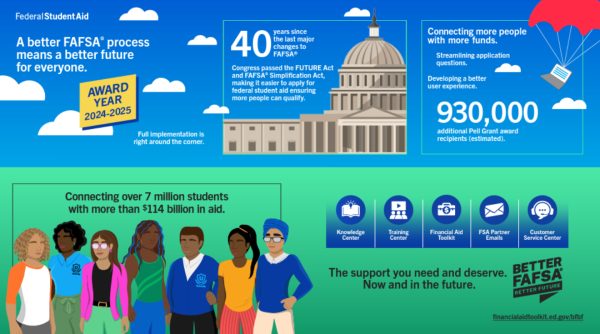Getting a college education in the United States can be extremely costly, with some institutions pricing their tuition at over $80,000 a year. For this reason, students applying to colleges and universities in the United States are advised to fill out the ‘FAFSA,’ or Free Application for Federal Student Aid. Completing this form makes students eligible to receive federal grants, loans, and scholarships to help pay for their college education.
In previous years, the FAFSA could ask families up to 108 questions about their financial circumstances, making completing the form tedious and time consuming. As of 2023, the United States Department of Education has updated the FAFSA to reduce the maximum number of questions to 46, as well as to increase student eligibility for financial aid. Making this major change has come with a series of setbacks, though.
In prior years, the FAFSA was released on October 1; however, with the creation of the new form still being in the process at that date, the FAFSA release was delayed to the end of December 2023. At that time, the form was only available sporadically, for about 30 minutes at a time. It was not made fully available to families until January 8, 2024.
Until now, schools have been able to send their admitted students’ financial aid letters in early March; but due to the form’s delayed release, the Department Of Education hadn’t sent students’ FAFSA information to colleges by that time. Many students are now still waiting to receive their financial aid letters, and with their uncertainty being sustained close to the colleges’ commitment deadlines, they may be unable to budget accordingly. Some students and families have been forced to pick up extra jobs and reduce their spending to ensure they can afford their college tuition if the financial aid letters do not match their expected need.
Many colleges and universities have pushed back their commitment deadlines from May 1 to June 1 to accommodate families who are still arranging their spending on tuition. However, there is worry that even with the pushback of this deadline, if students are unable to budget accordingly within the time given, they will be unable to register for college before the deadline.
The U.S. Department of Education has been facing criticism from lawmakers for the consequences of the new FAFSA’s delayed release. Sen. Bill Cassidy of Louisiana and Rep. Virginia Foxx of North Carolina arranged to have a letter sent to the Government Accountability Office, calling for an investigation on the Department of Education’s setbacks.






